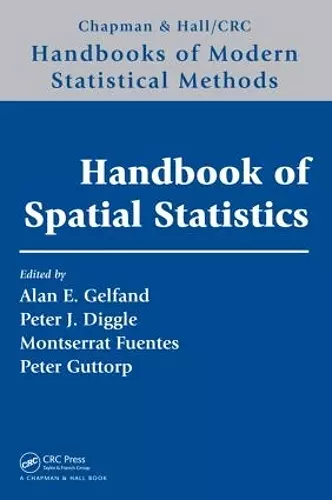Handbook of Spatial Statistics
Peter Guttorp editor Alan E Gelfand editor Peter Diggle editor Montserrat Fuentes editor
Format:Hardback
Publisher:Taylor & Francis Inc
Published:19th Mar '10
Currently unavailable, and unfortunately no date known when it will be back

Assembling a collection of very prominent researchers in the field, the Handbook of Spatial Statistics presents a comprehensive treatment of both classical and state-of-the-art aspects of this maturing area. It takes a unified, integrated approach to the material, providing cross-references among chapters.
The handbook begins with a historical introduction detailing the evolution of the field. It then focuses on the three main branches of spatial statistics: continuous spatial variation (point referenced data); discrete spatial variation, including lattice and areal unit data; and spatial point patterns. The book also contains a section on space–time work as well as a section on important topics that build upon earlier chapters.
By collecting the major work in the field in one source, along with including an extensive bibliography, this handbook will assist future research efforts. It deftly balances theory and application, strongly emphasizes modeling, and introduces many real data analysis examples.
I very strongly recommend this book for anyone working in spatial statistics at any level. The writing styles are all concise, informative, and even somewhat entertaining given the topic constraints. The editors have done a masterful job of organization and chapter authorship selection.
—Technometrics, May 2012
… a good starting point for entering each subarea of spatial statistics. … it can serve as a textbook at a graduate level for statistics majors … Handbook of Spatial Statistics is well edited and covers a wide range of topics, providing a very useful reference book for spatial statistics.
—Chae Young Lim, Journal of the American Statistical Association, December 2011
… each chapter is concisely written to the point of having no extraneous text but without resorting to overly terse discussion. … the layout and content [are] easily accessible for a variety of usage patterns. … the extensive bibliography provides ample direction for extra, more detailed reading. This Handbook is an excellent and clearly written first stop for any questions or queries one may have about spatial statistics. I wish I had owned this book years ago.
—Scott A. Sisson, Australian & New Zealand Journal of Statistics, December 2011
This book is certainly bound to become an influential classic in the field of spatial statistics. … reading it surpassed the expectations. It is a comprehensive piece of work that summarizes current state of the developments of the spatial statistics in its multitude. The range of topics covered is impressive … useful and enlightening for a wide scope of readers — from beginners to rather specialized researchers … Readers with an ISCB background will benefit from reading this book in many ways. … this book really sets the standard for modern spatial statistics as a field for years to come. Anybody even mildly interested in the theory or applications of various parts of spatial statistics should read it, or even better, to have it handy as an authoritative and remarkably useful reference.
—ISCB News, No. 51, June 2011
… the chapters have a very good scientific quality … the reading [is] rather easy and pleasant … the book thoroughly covers the field of spatial statistics and deserves its name of ‘handbook.’ It will be useful to specialists of spatial statistics as a reference book, and also to those who wish to learn the methods used in this field.
—Biometrics, June 2011
… an exciting handbook, aiming to present a comprehensive treatment of both classical and state-of-the-art topics in the area of spatial statistics. … this book is thoroughly edited and provides comprehensive, coherent, and unified summaries of specific methodological topics from spatial statistics. All the chapters were written by leading researchers in spatial statistics, with a good balance of theory and application through a synthesis of the key methodological developments and examples and case studies using real spatial data. … It is deeply impressive that the handbook covers such a wide range of topics ranging from spatial to spatial–temporal processes. … a valuable handbook for all researchers in spatial statistics, the biostatisticians interested in spatial epidemiology and ecology, and those who need up-to-date guidance in applying modern spatial methods to real data. I enjoyed reading this book very much and I would recommend it …
—Statistics in Medicine, 2011, 30
As spatial statistics is an important, fast growing field of statistics, it was time to publish a book like this which can be seen as a successor of the famous work by Noel Cressie. The authors are all high-ranked statisticians with great experience in both teaching and research. … The editors are to be credited for their achievement to unite so many methods of spatial statistics in one volume. The reviewer is sure that this will lead to great progress in spatial statistics … the reviewer warmly recommends this great volume to all spatial statisticians. …
—Biometrical Journal, 53 (2011), 1
… The time has come for a new reference book in spatial statistics. This handbook remarkably achieves this aim. … The editorial quality of the book is absolutely remarkable. … In some chapters, R or WinBugs code is made available. I strongly recommend Handbook of Spatial Statistics as a textbook for an advanced class in spatial statistics and as a reference book for anyone dealing with spatial data. It will definitely be one of my favorite books in the field for years to come, and I am convinced that it will be the case for many scientists. …
—Statistics and Computing, October 2010
ISBN: 9781420072877
Dimensions: unknown
Weight: 1310g
620 pages